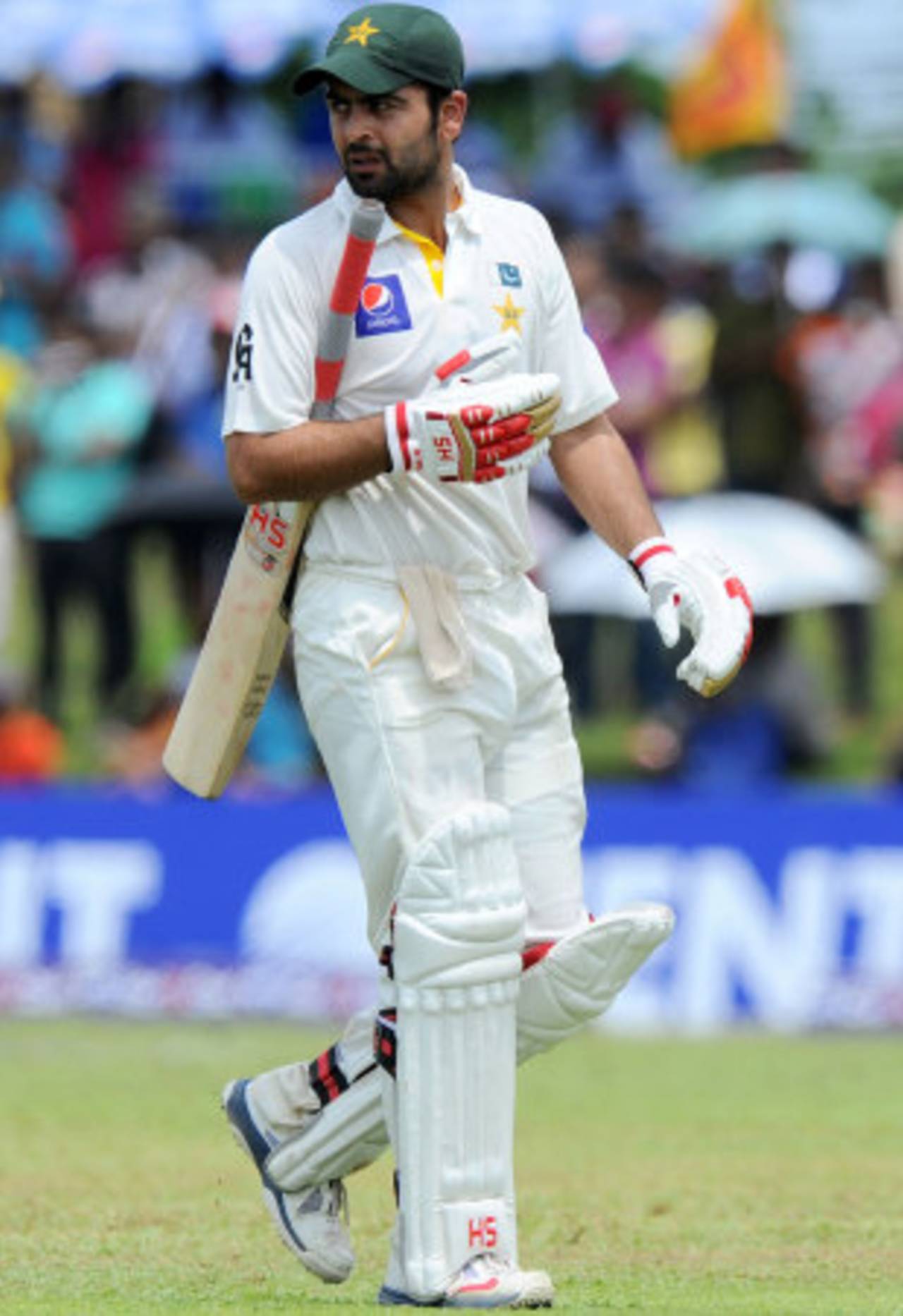Before the start of the fifth day, the contest was even and the signs pointed to a draw, but Pakistan's batting is as unpredictable as Galle's weather. Neither was supposed to behave the way they did. There was a 90% chance of rain but barely a drop fell - not until Angelo Mathews struck the winning hit, anyway. Pakistan were supposed to bat out two sessions with their six specialist batsmen and ensure safety, but what transpired wasn't so straightforward. Pakistan handed the hosts the match with their conservative approach and their subsequent dramatic slide.
The day started with calm weather and a gentle ocean lapping the Galle Stadium; in hindsight these were signs that something was about to give. Pakistan began the day 78 behind with nine wickets in hand. It wasn't a position from which they looked like losing the game, but they opened the door for Sri Lanka by switching to defensive mode.
The damage was largely self-inflicted. Ahmed Shehzad played out 62 dot balls in his 74-ball 16, Azhar Ali played out 127 dot balls out of 151, and Younis Khan kept blocking Herath before the left-arm spinner eventually dislodged him. Pakistan nibbled slowly at the deficit, and after erasing it built their lead in a drip, all the while losing wickets.
Panic set in when Azhar Ali and
Misbah-ul-Haq were out in the space of three balls, leaving Pakistan effectively 29 for 6. Sarfraz Ahmed alone showed some attacking intent, and even that came too late. Sri Lanka were left chasing a mere 99. It had taken only two sessions of poor cricket for Pakistan to go from a secure position to teetering on the brink of defeat. They fought hard from there, but they were defending too soft a target.
Only rain and bad light threatened to halt Sri Lanka's march. From around a quarter past five, the light began to fade and Shehzad, standing at point, waved his arms, gesturing to the umpires that he wasn't able to see the ball, but they weren't going to fall for it.
Pakistan never meant to win, perhaps, and were only looking for a draw. Since winning by an innings here in 2000, they had lost both Tests they played in Galle, most recently in 2012 by the hefty margin of 209 runs. Misbah, before arriving in Sri Lanka, had already admitted that Galle was Sri Lanka's "hunting" venue. This observation, perhaps, foreshadowed Pakistan's approach to the Test match. It seemed they were setting out to draw it when they scored 451 runs over six sessions, but it also seemed they were succeeding in that effort; what happened on the fifth day was hard to explain.
During the post-match conference, Misbah didn't offer a reason for the loss, and praised Sri Lanka instead, calling them the better team. When asked why there was a need for a defensive approach when Pakistan's batsmen could have negotiated the situation while playing their natural game, he said the over-caution wasn't pre-planned.
"I think there was no strategy," Misbah said. "Our plan was to play normal cricket and whichever delivery we get we will go for runs.
"I think we got under pressure the way Sri Lankan bowlers bowled and kept us under pressure according to their field. We didn't get balls to hit. I think on the last day the match situation also gets you under pressure and you make mistakes. Look, such things do happen, you sometimes are trapped in situations and we made mistakes being under pressure."
Pakistan had stressed even before the tour began that they hadn't been playing too much Test cricket in recent months. This, they maintained, had broken their momentum since their thrilling win in the Sharjah Test in January. This indeed is the second recent instance of Pakistan losing impetus thanks to a long gap between two Test series. In 2012, they lost another series to Sri Lanka following a six-month gap after beating England 3-0 in the UAE. This time, in contrast to Pakistan's long-form dormancy, Sri Lanka were well-prepared, having played Tests against England and South Africa.
While rustiness is a genuine issue, one thing cannot be disputed. Pakistan could definitely have saved the Test. Their batsmen certainly have the talent, but the approach they adopted here wasn't in keeping with their natural style. It is time the likes of Shehzad and Azhar are given the freedom to break out of their shell. They are better off being themselves.
Umar Farooq is ESPNcricinfo's Pakistan correspondent. @kalson
